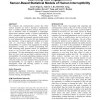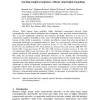252 search results - page 32 / 51 » Learning realistic human actions from movies |
CHI
2005
ACM
14 years 8 months ago
2005
ACM
The computer and communication systems that office workers currently use tend to interrupt at inappropriate times or unduly demand attention because they have no way to determine ...
ITS
2010
Springer
13 years 11 months ago
2010
Springer
Pedagogical tutorial tactics are policies for a tutor to decide the next action when there are multiple actions available. When the contents were controlled so as to be the same, l...
CONNECTION
2004
13 years 7 months ago
2004
While humans forget gradually, highly distributed connectionist networks forget catastrophically: newly learned information often completely erases previously learned information. ...
WMTE
2005
IEEE
14 years 1 months ago
2005
IEEE
Individual, unaided human abilities are constrained. Media have helped us to transcend boundaries in thinking, working, learning, and collaborating by supporting distributed intel...
CISSE
2008
Springer
13 years 8 months ago
2008
Springer
— Human centred services are increasingly common in the market of mobile devices. However, affective aware services are still scarce. In turn, the recognition of secondary emotio...


